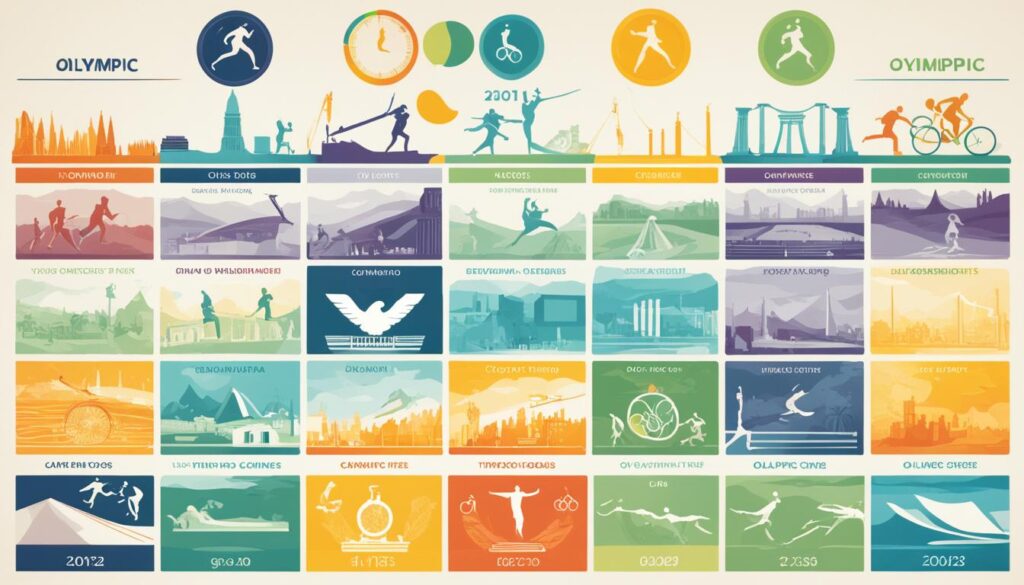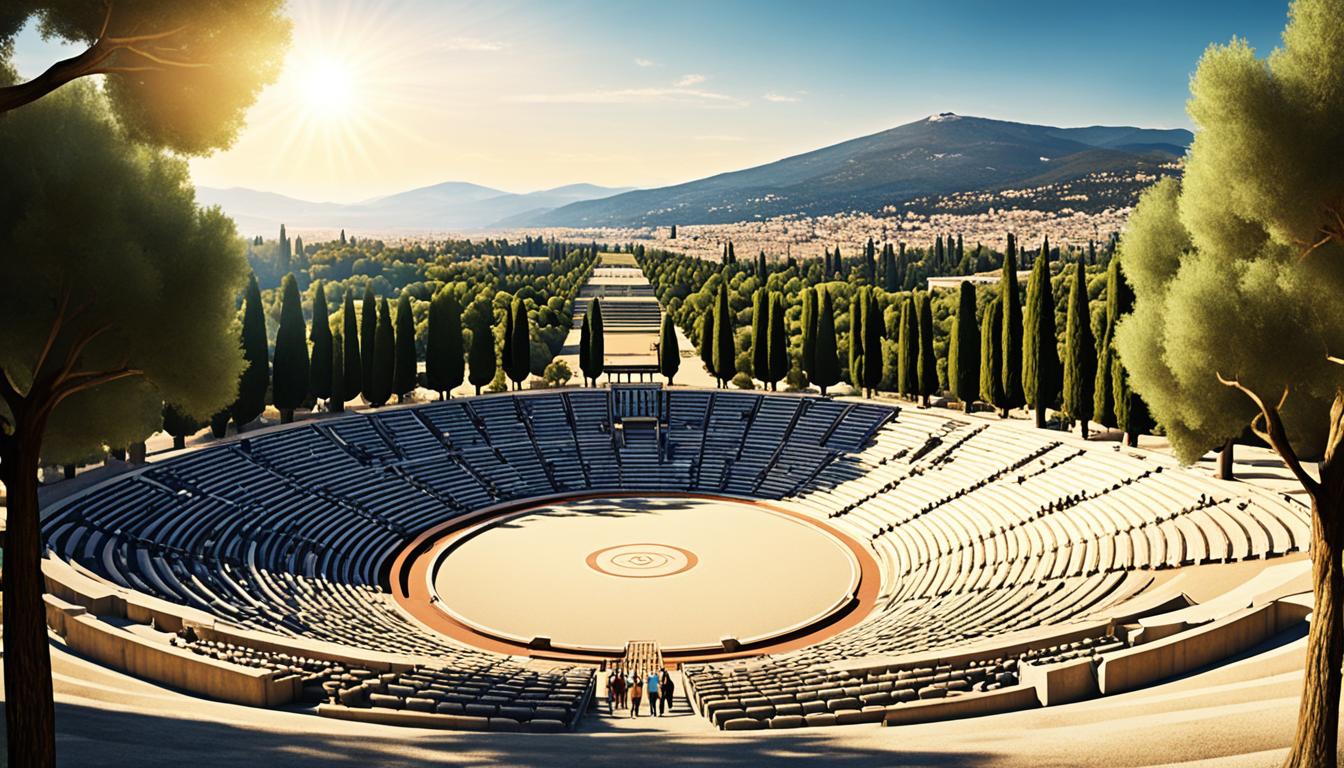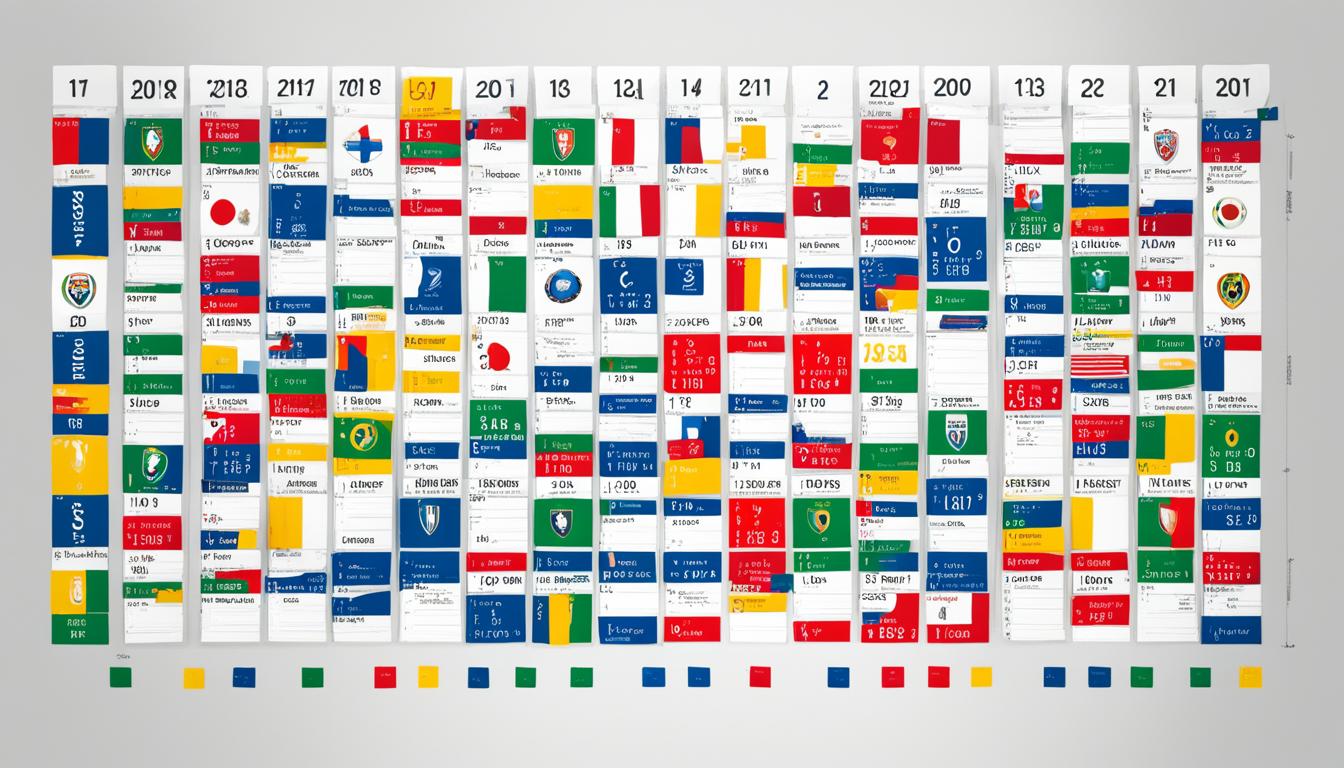The Olympic Games have a rich history that goes way back. They started in ancient Greece to honor Zeus, a god. These Games were a big deal in Greece, showing the best of the best in sports back then.
Jump to the late 1800s, and we have the modern Olympics kicking off. The first one was in 1896 in Athens, with athletes from 12 countries. Today, the Olympics are the top event for sports in the world.
The Olympics have seen lots of wins, big talks, and amazing moments. Now, they are about bringing people together. Athletes from everywhere come to compete and spread peace, showing the best of sportsmanship.
Key Takeaways:
- The Olympic Games originated in ancient Greece over 3,000 years ago.
- The modern Olympics began in Athens in 1896 and have since become the world’s premier sporting event.
- The Games have evolved and grown over the years, showcasing the achievements of athletes from various countries.
- The Olympics symbolize global unity and the pursuit of athletic excellence.
- The Games promote peace and fair play among nations.
Ancient Olympic Games: A Glorious Past
The ancient Olympic Games are key to understanding sports history. They began around 776 B.C. and made a lasting impact on Greek culture. Ancient Greeks loved these games. Let’s explore their history and key facts.
The Birth of the Ancient Olympic Games
The Games started with a single race called the stade. Over time, more events were added, thrilling the audience. Events like the diaulos, dolichos, pentathlon, boxing, and chariot racing showed off the Greeks’ athletic skills. These games were very popular.
Ancient Olympic Games Timeline
| Year | Event | Significance |
|---|---|---|
| 776 B.C. | First recorded Olympic Games held | The birth of the ancient Olympic Games |
| 724 B.C. | Introduction of diaulos (double-stade race) | Expansion of events |
| 720 B.C. | Introduction of dolichos (long-distance race) | Growth in diversity of athletic challenges |
| 708 B.C. | Introduction of pentathlon | Developing a comprehensive measure of an athlete’s skill |
| 688 B.C. | Introduction of boxing | Incorporating combat sports |
| 680 B.C. | Introduction of chariot racing | Addition of a thrilling equestrian event |
The Religious Significance
The ancient Olympic Games honored Zeus, the king of the Greek gods. They were a big part of Greek religious life. The city of Olympia hosted the games every four years, attracting people from all over Greece.
“The ancient Games honored the gods and forged a sense of unity among the Greek city-states, promoting peace and friendly competition in a society occasionally marred by conflicts.” – Greek historian, Herodotus
The games were more than religious events. They were where people talked politics, shared cultures, and celebrated together. Athletes and visitors from different city-states came to connect and build friendships, overlooking their differences.
The ancient Olympic Games show the power of sports to unite people. They inspired the modern Olympic Games, encouraging athletes to aim high and achieve greatness.
Evolution of the Olympic Games
After the ancient Olympic Games ended, there was a long pause. This was because the Roman Empire took over Greece. But in the late 1800s, Baron Pierre de Coubertin from France had a big dream. He wanted to bring the Olympics back as a worldwide sports event.
The first modern Olympics were in 1896 in Athens. They brought the Games back to the global stage. Athletes from 12 countries came to compete, showing unity and friendship. The Games have grown since then, amazing people everywhere with skill, determination, and fair play.
Baron Pierre de Coubertin’s vision to revive the Olympic Games is a testament to his commitment to fostering international understanding and cooperation through sports. His efforts laid the foundation for the modern Olympics, which have become a global phenomenon.
The Olympics have changed a lot over time. They have added new sports and welcomed athletes from all over. This lets a wide range of talents participate and compete at their best.
The Games also show how society has progressed. Advances in technology and media have made the Olympics better and more accessible. Now, people everywhere can watch the athletes and their stories as they happen.
The Olympic Games: A Global Showcase of Excellence
The modern Olympics are about more than sports. They stand for excellence, celebrating diversity, and the strength of coming together. Athletes from various places and backgrounds compete fairly, inspiring others and breaking down barriers.
As the Games grow and influence, they show the lasting strength of the human spirit. Its dedication to greatness has evolved from ancient Greece to today’s global stage. The Olympic Games are now a place for athletes to shine and share their amazing abilities with the world.
| Year | Host City | Number of Participating Nations |
|---|---|---|
| 1896 | Athens, Greece | 12 |
| 1900 | Paris, France | 24 |
| 1904 | St. Louis, United States | 12 |
| 1908 | London, United Kingdom | 22 |
| 1912 | Stockholm, Sweden | 28 |
Olympic Games Traditions and Significance
The Olympic Games have a long history and are loved worldwide. They’re full of tradition that brings people together, showing unity and peace. They also stand for fair competition.
Olympic Flame
The lighting of the Olympic flame is a special tradition. It starts with the sun’s rays in Olympia, Greece. A mirror focuses the sun to light the flame. This flame then travels the world, carried by different people. It shows the ongoing legacy and spirit of the Games.
Olympic Oath
During the opening ceremony, an athlete promises to play fair on behalf of all competitors. They swear to follow the rules and respect the spirit of the Games. This oath is about playing fair and being ethical.
The Olympic Rings
The Olympic symbol has five rings that are linked together. They are blue, yellow, black, green, and red. Created by the founder of the modern Olympics, these rings show the world coming together. They symbolize the unity of athletes from five continents.
“The Olympic Games are not just a sporting event, but a celebration of our shared humanity and the power of sport to bring people together.” – Juan Antonio Samaranch
The Olympic Games break down walls between nations, cultures, and political beliefs. They bring together athletes from all over in a quest for excellence. These Games are about peace, understanding, and friendship among nations.
By keeping these traditions, the Olympic Games inspire both athletes and fans. They remind us of values that are bigger than any one country or moment in time.
Decline and Revival of the Olympic Tradition
After centuries of glory, the ancient Olympic Games began to fade. This decline was sped up by the Roman Empire taking over Greece. Emperor Theodosius I banned all “pagan” festivals, including the Olympics, causing them to be forgotten for about 12 centuries.
In the late 19th century, everything changed thanks to Baron Pierre de Coubertin. As a French educator and historian, he saw sports as a way to bring countries together and promote peace. He was inspired by the ancient Olympics and worked hard to bring them back.
Coubertin created the International Olympic Committee (IOC) in 1894. He wanted the Olympics to be a global sports event again. His dream came true with the Athens Olympics in 1896, welcoming athletes worldwide.
“The most important thing in the Olympic Games is not winning but taking part; the essential thing in life is not conquering but fighting well.” – Baron Pierre de Coubertin
The return of the Olympic Games started a new chapter in sports and international friendship. The Games grew in popularity, being hosted in different cities every four years. Today, the IOC keeps the spirit of the \Games alive, focusing on fair play, inclusivity, and world unity.
The Olympics Through the Years
The modern Olympics are a major global event today, starting back in Athens in 1896. That first Olympics had 280 athletes from 12 nations. It began the tradition of sport and unity that we love worldwide.
The Olympic Games have grown in both size and sports. Athletes from around the world compete every four years. They show their skills in sports ranging from track to basketball.
The Olympics symbolize global unity. Athletes from various nations unite, fostering friendship. These Games show how sport can bring people together beyond borders.
1889 – Paris: The Olympic Movement Begins
In 1889, Pierre de Coubertin brought up the idea of the Olympics in Paris. This led to the modern Olympic Games we see today.
1924 – Chamonix: The Winter Games Debut
The Winter Olympics started in Chamonix, France, in 1924. This introduced winter sports like skiing and ice hockey, offering athletes a new stage.
The Olympics have had a lasting impact on sports and culture. They’ve given us unforgettable moments, like Jesse Owens in 1936 and Usain Bolt in 2008 and 2012. Every Olympic Games is unique, showcasing the height of athletic talent.

The Olympic Games promise to keep inspiring us. They show what humans can achieve with determination and the spirit of unity. The Olympics have evolved from humble beginnings to awe-inspiring spectacles. They will always be important to athletes and fans.
Olympic Games Facts and Trivia
The Olympic Games have a rich history filled with interesting facts. From ancient rituals to today’s traditions, they’ve always fascinated us.
The Birthplace of the Olympics
Olympia, Greece, is where it all began. This sacred site gave the Games their name. It’s a place of athletic competition and spiritual focus.
The Marathon Legacy
The marathon race started with a Greek soldier’s legendary run. He raced from Marathon to Athens with battle news. This act inspired the marathon, which is about 26.2 miles long.
The Olympic Flame and Torch Relay
The Olympic flame lighting is a key tradition. It links today’s games to ancient Greece, where a flame always burned. A parabolic mirror lights the flame in Olympia, showing unity between the old and new Games.
The torch relay carries the flame across cities and countries. It ends with the cauldron lighting at the Opening Ceremony. This tradition brings excitement and unity for the upcoming Games.
“The Olympic flame carries not only the sacred connection to the ancient Games but also the spirit of unity and competition that brings nations together.”
Awarding the Olympic Medals
How we give out Olympic medals has changed. In the early modern Olympics, first got silver, second got bronze. Gold, silver, and bronze medals started in 1904.
Now, each Olympic medal design is unique, reflecting the host city’s culture. They stand for excellence, effort, and fair play.
| Year | City | Medal Design |
|---|---|---|
| 2008 | Beijing | Depicts the Parthenon, symbolizing the connection between ancient and modern Greece. |
| 2012 | London | Features the River Thames, emphasizing the importance of water in London’s history. |
| 2016 | Rio de Janeiro | Inspired by nature and sustainability, incorporating elements of leaves and branches. |
| 2021 | Tokyo | Showcases traditional Japanese designs, including Tokyo’s famous cherry blossoms. |
Each Olympic Games brings a unique medal design. It showcases the host city’s legacy and culture.
Olympic Games Trivia: Did You Know?
- The Olympic Games have been canceled only three times: during World War I (1916), World War II (1940 and 1944), and due to the COVID-19 pandemic (2020).
- Michael Phelps is the most decorated Olympian, with 23 gold medals.
- The 1900 Paris Olympics had unique events like live pigeon shooting and a swimming obstacle race.
- The youngest Olympian was Dimitrios Loundras, a 10-year-old gymnast in 1896.
These facts show why the Olympic Games are so captivating. Each edition adds to the legacy and spirit of the Games.
Conclusion
The Olympics started long ago in Greece, back in 776 B.C. Today, they are a global event that reaches everyone. They show us how sports can bring peace, unity, and celebrate the best in athletics.
The Olympics have grown from a small religious event in Greece to the top sports event in the world. They have broken down time and cultural walls. Now, athletes from everywhere come together to compete.
The Games give nations a chance to compete in a friendly way. Old rivalries are forgotten, and athletes share the goal of showing their skill. The Olympics highlight the best in physical achievements. They remind us of the importance of diversity, inclusion, and our shared humanity.
FAQ
What is the history of the Olympic Games?
The Olympic Games started about 3,000 years ago in Greece. They were held every four years in Olympia to honor Zeus.
When did the modern Olympics begin?
The modern Olympics kicked off in 1896 in Athens. They are now the top sports event worldwide.
What events were part of the ancient Olympic Games?
Ancient Olympic events began around 776 B.C. They included footraces, chariot races, boxing, and the pentathlon.
How did the ancient Olympic Games decline?
The ancient Games faded after Greece fell to the Roman Empire. They stopped for over 1,000 years.
Who revived the Olympic Games?
Baron Pierre de Coubertin from France wanted to bring back the Olympics. He aimed for an international sports competition in the late 1800s.
When and where were the first modern Olympics held?
The first modern Olympics happened in Athens in 1896. Athletes from 12 nations competed in various sports.
What are some Olympic Games traditions?
Olympic traditions include the lighting of the flame, the Olympic oath, and the five interlocking rings symbol.
What is the significance of the Olympic Games?
The Olympics let athletes from all over the world compete. They promote peace and unity through fair play.
What are some interesting Olympic Games facts?
Interesting facts: the ancient Games were in Olympia, Greece. The marathon was inspired by an ancient Greek soldier. The Olympic flame and torch relay started in the modern Games.





